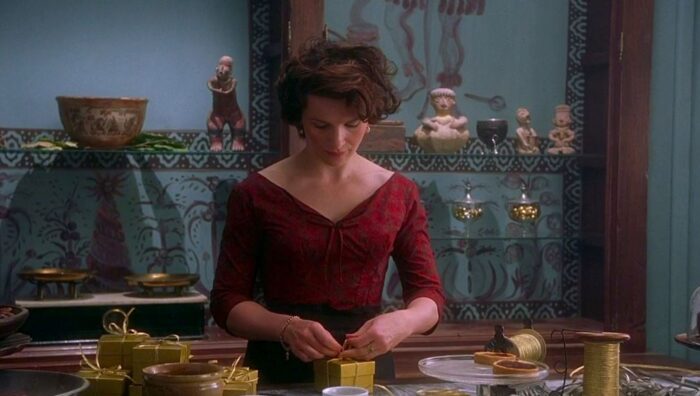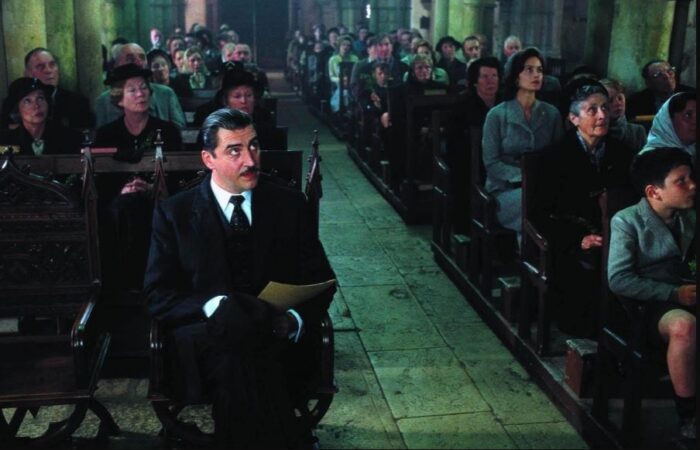
The 73rd Academy Awards (2001)
Nominations: 5
Wins: 0
There’s a strange allure to “bad” movies that get nominated for Best Picture. Now, Chocolat isn’t bad. In fact, I was on board for about forty minutes, but it’s far from the caliber you’d expect for the most prestigious award in all of cinema. The year 2000 alone had Gladiator, Crouching Tiger, Hidden Dragon, Erin Brockovich, and Traffic—all movies that are well-liked and still discussed today. Then there’s Chocolat.
The title alone reeks of pretension. I get that the film is set in France, and “chocolate” in French is “chocolat,” and that it’s based on a book called Chocolat but the film is not a French production, nor is the book by a French writer. Who are we trying to impress? Critics? With that “impressive” 68% Rotten Tomatoes score?
This is a film that was nominated for awards solely because it LOOKS like it should be nominated for awards. I don’t believe Chocolat deserved any of its nominations. Again, it’s not a terrible movie, but there’s little here that’s ambitious, interesting, or worth a two-hour runtime. How does a movie like Chocolat become an Oscar contender? Let’s try to find out.
Set in 1959, Vianne (Juliette Binoche) and her six-year-old daughter, Abouk (Victoire Thivisol), arrive in a small French village to open a chocolate shop, La Céleste Praline, on the square opposite the local church. This draws the ire of the town’s mayor, Comte de Reynaud (Alfred Molina), and Vianne is branded a “bad influence” for opening her shop in the middle of Lent.
I appreciate that the story depicts these repressed religious townsfolk as petty enough to label someone an outsider just because they’re selling chocolate during Lent. Feels real (unfortunately).
Vianne, a master chocolatier with a deep knowledge of the history of chocolate and a belief in its spiritual properties, forms friendships with a few locals who discover that Vianne’s chocolate has a chemical catalyst that helps them reconnect with their emotional and spiritual bodies.
These locals include Joséphine (Lena Olin), an abused wife who later works in the shop; Luc (Aurélien Parent-Koenig), a lonely boy with a passion for drawing; Yvette (Elisabeth Commelin) and her husband, Alphonse (Ron Cook), who rekindle their love life thanks to Vianne’s chocolate; a sad old man, Guillaume (John Wood); and the great Dame Judi Dench as Armande, Vianne’s crotchety landlady, who learns to enjoy herself again thanks to Vianne’s world-class hot cocoa.
All the scenes of swirling chocolate and Juliette Binoche making handmade sweets are delectable. The problem is a lack of narrative thrust to make the back half compelling. Coincidentally, this issue arises just as we are introduced to Roux, a swarthy river rat with a ponytail played by none other than Johnny Depp.
Tumultuous personal life aside, I’m a fan of Johnny Depp, but man, he is wrong for this part. I get the thought process. I’m sure the casting was looking for the kind of lothario you’d find on the cover of a paperback romance novel and Depp is handsome, but he feels too contemporary to play a 1950s French Romeo. The first time we see him, he’s playing a guitar on a boat with his traveling group of Romani, and he looks like he stepped right out of a modern-day Dior ad.
If you’re wondering what Depp or anyone else is doing, acting-wise, it’s the dealer’s choice. Every actor is doing their own thing, and I found it distracting. Never did I feel like this was actually France in the 1950s. Chocolat feels like it’s set in “Whimsical Hollywood Village Land!” If you want to argue that choice was intentional, that’s fine, but I found it distracting.
The mayor convinces the townspeople that Vianne is wicked by adding his own interpretations to the local priest’s (Hugh O’Conor) sermons. There’s a fire, a tragic death, and Vianne wants to leave town, but her daughter doesn’t. It all sounds much more dramatic than it actually is. Chocolat doesn’t deserve to be two hours long, moving slower than melting chocolate.
However, Vianne’s luck changes when, out of desperation before Easter, the mayor eats all the chocolate in her shop window and realizes he’s been wrong the entire time. Vianne is redeemed, and everyone lives happily ever after. Real schmaltzy but that’s what the olds enjoy, which is why this film was a contender. But in a year with Almost Famous, Before Night Falls, Cast Away, High Fidelity, Love & Basketball, Requiem for a Dream, and The Virgin Suicides, this feels more like a pretender.




My only memory of Chocolat is my mom borrowing it from the library around when it came out on home video. I walked by on a scene where I think Peter Stormare makes a big show of trying to win back his wife and she rejects him and I said I felt bad for him. My mom told me I shouldn’t because he doesn’t deserve forgiveness. And I was young enough that it stuck with me as a lesson about how life is more complicated than just saying you’re sorry.